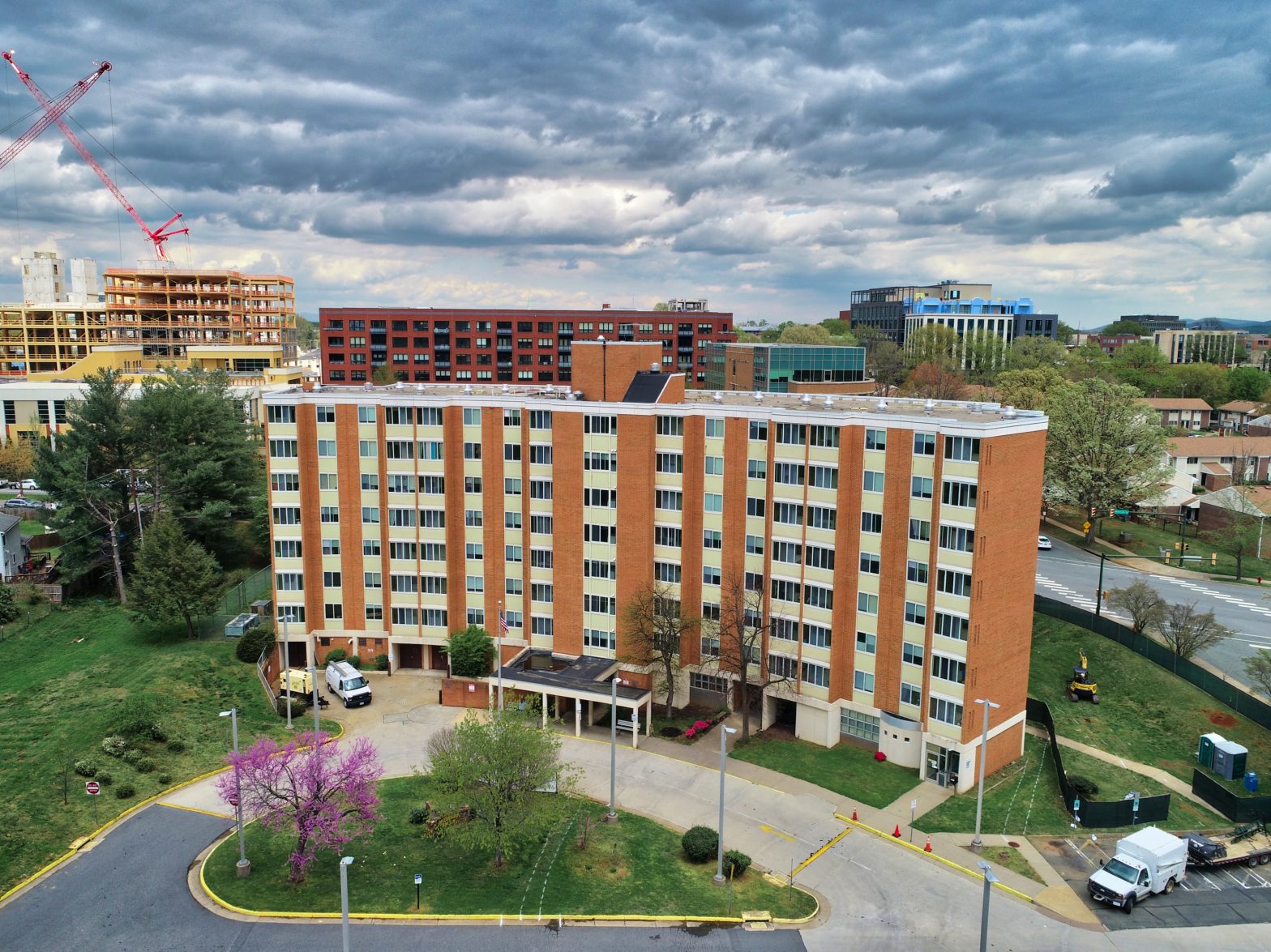For more than 20 years, Crescent Halls residents have been speaking out about the intolerable living conditions in the public housing apartments, including leaky laundry machines, broken air conditioners, sweltering heat, sewage flooding, busted elevators, bed bugs, and cockroaches. Charlottesville leaders vowed in 2010 to redevelop the 45-year-old complex for seniors and disabled residents—along with other public housing communities across the city—but plans repeatedly fell through.
Thanks to persistent activism and leadership from the people who live in those communities, change is on the way. Last Wednesday, Crescent Halls residents broke ground for long-overdue renovations, which are expected to be completed by October 2022.
“Everybody deserves not just housing to go to, but housing that has been created with intention and with love,” said Mayor Nikuyah Walker at the ceremony, where she was joined by several other local and state leaders. “Once we understand that and act on that, then we start the process of showing people that we honor them…[and that] promises that have been broken for decades are finally being fulfilled.”
Over the next 18 months, the 105-unit building will be fully revamped with new heating, cooling, electrical, lighting, plumbing, sprinkler, elevator, and security systems. Appliances, cabinets, bathrooms, windows, common areas, outdoor spaces, and the parking lot will also be upgraded.
Renovations on the eight-story structure will begin April 30, and it will be conducted two floors at a time. While their floor is under construction, residents will be relocated to temporary housing, paid for by the Charlottesville Redevelopment and Housing Authority. The renovations will cost $18 million.
Crescent Halls isn’t Charlottesville’s only major public housing project currently underway. In March, the city kicked off the redevelopment of the South First Street complex, which will see more than a hundred new units and various amenities added to the neighborhood over the next few years.
Last week’s ceremony began in front of Crescent Halls with a moment of silence for more than a dozen residents, including Richard Shackelford, Eve Snowden, Edith Durette, and Curtis Gilmore, who fought for the building’s renovations but passed away before they came to fruition.
“The most precious time for me was just being able to sit in the community room here with the gentlemen who really worked hard to get this done,” said resident Audrey Oliver.
“They knew painting, carpentry, plumbing—they knew all of that,” she added. “They never even got to see this stage of it. That’s heartbreaking for me.”
Brandon Collins, lead organizer for the Public Housing Association of Residents, reflected on Charlottesville’s painful legacy of urban renewal, which resulted in the destruction of several thriving Black communities, and forced many Black residents to move into public housing in the ’60s and ’70s.
“We hear a lot about Vinegar Hill—but it also happened here on Garrett Street, and that was the birth of this building,” explained Collins. “[Crescent Halls] was sold to the community as this grand, amazing thing that was going to happen for seniors in our community. And I think for a short time it was that. But federal and local divestment, and the challenges of systemic racism and disrespect in this community has led to a really hard slog at Crescent Halls.”
People shouldn’t have to wait for decades for their basic needs to be met
Mayor Nikuyah Walker
In response to the city’s failures to upgrade its public housing communities, PHAR worked with hundreds of residents to create a positive vision statement in 2016, stressing residents’ desire to lead the redevelopment process. In 2019, the Charlottesville Redevelopment and Housing Authority approved a partnership between PHAR and several developers, getting the ball rolling on the redevelopment of Crescent Halls and South First Street.
At the ceremony, state Delegate Sally Hudson lauded Charlottesville’s leadership in resident-led public housing redevelopment, not just in the state but nationwide.
“Across the country, there are communities that are disinvesting from public housing [and] shifting more and more control out of the hands of the community and into private hands,” she said. “You really are not just leading our community—you are leading Virginia.”
“It was hard [and] painful work because there’re so many decisions that seem like obstacles,” said Collins to the residents who spearheaded the redevelopment process. “But y’all were reasonable about it and had a vision and here we are today—getting ready to break ground on something that many people in this community said would never happen.”
“[The renovations] are going to be noisy. The housing authority’s got earplugs for you,” added Collins. “We’re here to help you through this difficult process.”
Walker criticized the city for not listening to residents’ calls for help sooner.
“People shouldn’t have to wait for decades for their basic needs to be met. That happens when a community doesn’t own its responsibility,” she said. However, “I’m thankful to be a part of a community who, even though we did not get it right for a long time, finally has come together to get it right and make the commitment.”
The mayor also encouraged residents to voice any needs and concerns throughout the renovation period.
“Pick up the phone and call,” she said. “It’s not a pressure. It’s not us doing you a favor. It’s not charity. It is our responsibility.”










